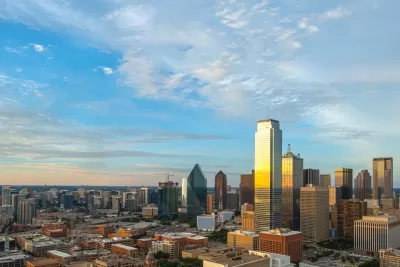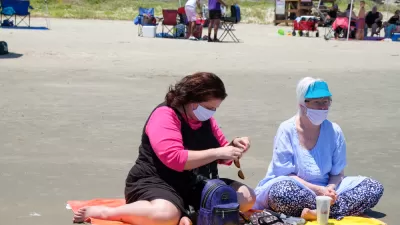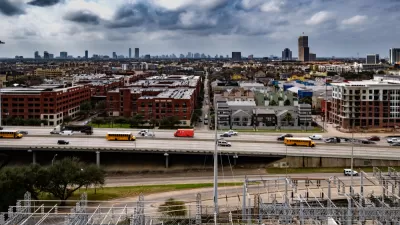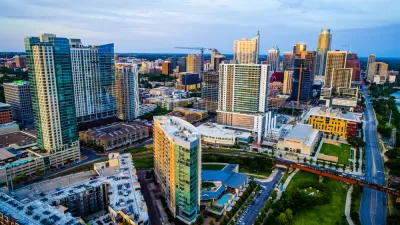Dallas will need voter approval to overcome tax increase obstacles put in place by the Texas State Legislature.

"Dallas is feeling COVID-19′s financial impact, and now officials may consider raising property taxes to shore up next year’s budget," reports Obed Manuel.
City Council members are considering a resolution that would set the stage to raise city’s property tax revenue grew by 8%. "The Texas Legislature last year capped property tax revenue increases at 3.5%. Anything higher than that requires voter approval," according to Manuel.
The City Council deliberates as the city prepares to deal with a loss of annual revenue somewhere between $73 million and $134 million as a consequence of the pandemic, according to the article.
For context of the tax revenue situation in Dallas relative to the other large cities in Texas, a new report by the Kinder Institute for Urban Research compares the tax structure of Dallas, Houston, and San Antonio, predicting that all three will have to reduce service as a result of declining revenue in 2020. Each of the three largest Texan cities will encounter constraints when trying to generate new sources of revenue to make up the difference, but the report specifically notes that new state law limiting property tax increases in the case of both Dallas and San Antonio.
Houston's constraints "include the locally imposed revenue cap, the lack of a solid waste collection fee, the fact that the city maintains its own health department and the sequestering of general fund revenues for public works under ReBuild Houston," according to the report.
For national context, the Lincoln Institute of Land Policy has created a new report to follow developments in property tax policies as cities deal with the financial consequences of the pandemic (in addition to gathering past work on property tax together as a resource for COVID-19). The "Property Tax and COVID-19" report is available to read online for free.
FULL STORY: Dallas weighing 8% property tax hike as city faces revenue shortages

Maui's Vacation Rental Debate Turns Ugly
Verbal attacks, misinformation campaigns and fistfights plague a high-stakes debate to convert thousands of vacation rentals into long-term housing.

Planetizen Federal Action Tracker
A weekly monitor of how Trump’s orders and actions are impacting planners and planning in America.

San Francisco Suspends Traffic Calming Amidst Record Deaths
Citing “a challenging fiscal landscape,” the city will cease the program on the heels of 42 traffic deaths, including 24 pedestrians.

Defunct Pittsburgh Power Plant to Become Residential Tower
A decommissioned steam heat plant will be redeveloped into almost 100 affordable housing units.

Trump Prompts Restructuring of Transportation Research Board in “Unprecedented Overreach”
The TRB has eliminated more than half of its committees including those focused on climate, equity, and cities.

Amtrak Rolls Out New Orleans to Alabama “Mardi Gras” Train
The new service will operate morning and evening departures between Mobile and New Orleans.
Urban Design for Planners 1: Software Tools
This six-course series explores essential urban design concepts using open source software and equips planners with the tools they need to participate fully in the urban design process.
Planning for Universal Design
Learn the tools for implementing Universal Design in planning regulations.
Heyer Gruel & Associates PA
JM Goldson LLC
Custer County Colorado
City of Camden Redevelopment Agency
City of Astoria
Transportation Research & Education Center (TREC) at Portland State University
Jefferson Parish Government
Camden Redevelopment Agency
City of Claremont





























